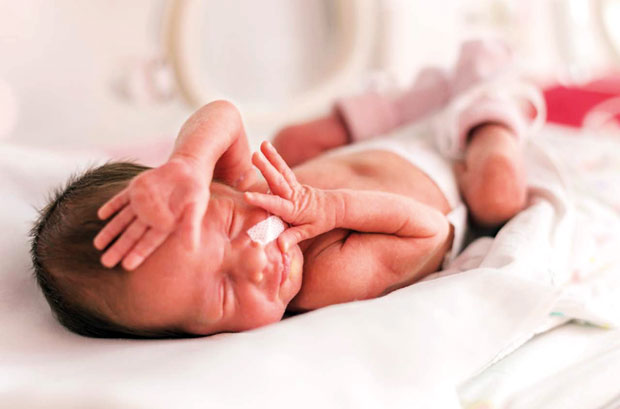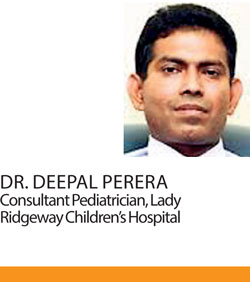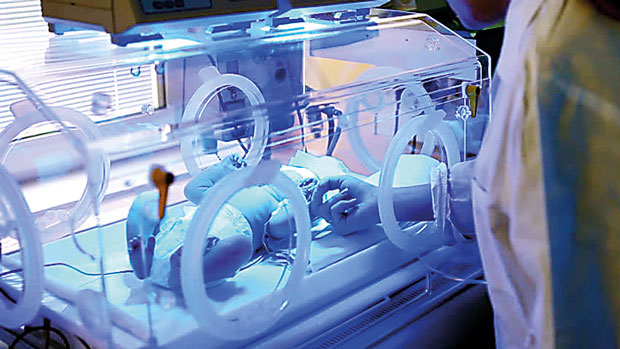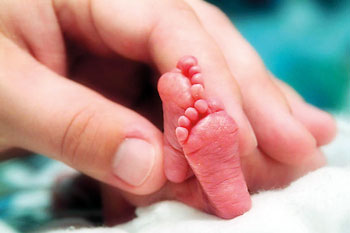15 Sep 2017 - {{hitsCtrl.values.hits}}
 The process of producing a live human being starting from a single cell is fascinating. It’s made even more amazing by the fact that each step is perfectly synchronized and happens during a specific time period. A foetus usually spends 38 weeks in the mother’s womb. For each week, there are specific changes the foetus goes through, until he is ready to come out and face the world. If the baby is delivered between 37-42 weeks of gestation, that birth is called a ‘term birth’
The process of producing a live human being starting from a single cell is fascinating. It’s made even more amazing by the fact that each step is perfectly synchronized and happens during a specific time period. A foetus usually spends 38 weeks in the mother’s womb. For each week, there are specific changes the foetus goes through, until he is ready to come out and face the world. If the baby is delivered between 37-42 weeks of gestation, that birth is called a ‘term birth’
But there are instances that things don’t go according to plan and the baby has to come out early. They are called premature babies. Even though the survival rate of preemies is increasing continuously, thanks to the advancement of medicine, they have a harder time adapting to the outside world because they were delivered prematurely. So we decided to consult Dr. Deepal Perera, Consultant Pediatrician, Lady Ridgeway Children’s Hospital regarding premature babies.

According to Dr. Perera, premature babies are defined as babies born below 37 weeks of gestation. These births are again sub divided into late preterm (Between 34-36 weeks), moderately preterm (32-34), Very preterm (less than 32 weeks) and Extremely preterm, (less than 25 weeks). The lesser the gestational age, the more severe the risk of complications because they are less adapted to the life outside the womb. Dr. Perera asserts that thanks to the advancement of medicine, babies born at 26 weeks of gestation are compatible with life in Sri Lanka. “But we’ve seen many cases where 24-25 week babies have also survived,” he states further.
Possible complications
 Still, the fact that they aren’t fully prepared to face the challenges of the outside world, when compared with ‘term’ babies, can’t be denied. These preemies are likely to have lower birth weight than is ideal, which might lead to complications. They are also more likely to suffer from Hypothermia, hypoglycaemia and feeding problems, said Dr. Perera. “Hypothermia, a condition where the baby has abnormally lower body temperature, is because it doesn’t have enough body fat to generate heat necessary to maintain the body temperature. In order to avoid this the baby is kept well covered, sometimes in an incubator until he can adapt to the environment,” said Dr. Perera.
Still, the fact that they aren’t fully prepared to face the challenges of the outside world, when compared with ‘term’ babies, can’t be denied. These preemies are likely to have lower birth weight than is ideal, which might lead to complications. They are also more likely to suffer from Hypothermia, hypoglycaemia and feeding problems, said Dr. Perera. “Hypothermia, a condition where the baby has abnormally lower body temperature, is because it doesn’t have enough body fat to generate heat necessary to maintain the body temperature. In order to avoid this the baby is kept well covered, sometimes in an incubator until he can adapt to the environment,” said Dr. Perera.
Ever wondered how a baby automatically knows how to breast feed, soon after it is born? This is due to a reflex action called suckling reflex, that’s ingrained into them at birth. But in preemies, this reflex may not be fully developed. Therefore they are more likely to have feeding problems in the beginning. “In that case they will sometimes have to be fed through a small tube,” said Dr. Perera. Premature babies are also at a higher risk of getting hypoglycaemia, or low blood sugar, so they should be fed
more frequently.
Our lungs are kept expanded with the help of a liquid called surfactant. Without surfactant the lung tissue would collapse on itself in expiration, making respiration difficult. This surfactant is produced in the last few weeks of gestation. Therefore prematurely born babies are more likely to suffer from Surfactant deficiency. This gives rise to a condition called Infant Respiratory Distress Syndrome, according to Dr. Perera. “In these cases surfactant has to be given artificially and the baby may need ventilation until the issues are resolved,” he further explained.
Their immune system is also not matured as expected, resulting in premature babies being more prone to infections. So, the carers should always follow proper hand washing techniques and other hygienic measures when handling babies. Breast feeding is the ideal method of nutrition which reduces the risk of some infections in the gastrointestinal tract, even though this isn’t practically possible in all cases.
In addition to these they also have a higher chance of getting neonatal jaundice or yellowish discolouration of the skin and bleeding problems because their liver has yet to reach full maturity.

Ever wondered how a baby automatically knows how to breast feed, soon after it is born? This is due to a reflex action called suckling reflex, that’s ingrained into them at birth. But in preemies, this reflex may not be fully developed.
Long term risks
Premature birth exposes babies to long term risk as well. They have a higher chance of developing hearing and vision problems, specifically a condition called Retinopathy Of Prematurity (ROP) and rickets. The incidence of Cerebral Palsy and learning disorders is also higher among preemies. So it’s important that premature babies have regular follow ups with a paediatrician even after they are discharged from hospital. This will aid in diagnosing any complications that arise and prevent them or if not, minimize their impact, according to Dr. Perera.
Care at home
When asked about how to care for the baby after being discharged from the hospital, Dr. Perera advised the carers to continue with good hygienic practices even at home. This he said will minimize the chance of catching infections. He advised to keep the baby warm by covering the head and the legs as well when the baby is taken outdoors.
It’s important to always keep notes on the growing progress of the baby. If any stage is unusually delayed, talk to your midwife or a healthcare provider. If any future ophthalmology or audiology are advised, follow them up on time.
Prevention of preterm delivery
Is there any way of preventing preterm delivery? Dr. Perera advised women who have had a history of more than one abortion or preterm deliveries to consult their obstetrician early during pregnancy. “Some causes for preterm delivery can be treated, if identified early enough.” said Dr. Perera. If the cause is something like the cervix being short, the cervix can be kept artificially closed. If the pregnant mother is having complications like pregnancy induced Diabetes Mellitus, Hypertension or infections  then they have to be managed. Women experiencing multiple pregnancies also have a higher risk of going in to labour before term. Smoking is also found to have a relationship with preterm deliveries, so abstaining from smoking and preventing exposure to cigarette smoke, during pregnancy is improtant.
then they have to be managed. Women experiencing multiple pregnancies also have a higher risk of going in to labour before term. Smoking is also found to have a relationship with preterm deliveries, so abstaining from smoking and preventing exposure to cigarette smoke, during pregnancy is improtant.
“If there’s a risk that the baby will be born prematurely, it’s ideal that the delivery is done in a hospital with a good neonatal care unit to ensure the baby gets the maximum care,” concluded Dr.Perera.
Addition of a new member to the family is a wonderful experience. If that member decides to arrive a little earlier than expected, don’t let that spoil your happiness as parents. Today’s medicine has advanced rapidly and there is much that can be done to improve a challenging situation. Be alert, follow medical advice and enjoy the precious addition to your life.
23 Dec 2024 2 hours ago
23 Dec 2024 3 hours ago
23 Dec 2024 6 hours ago
23 Dec 2024 7 hours ago